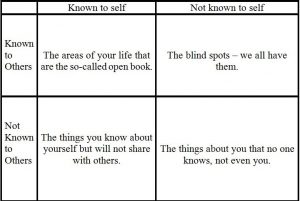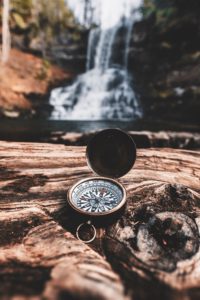I’m fascinated with thresholds, the ground between us, the spaces between, and the edge of chaos. The void between one thing and another is filled with unknown possibility.

Tarot cards appeared in the fourteenth century, when they were used primarily for play. Sometime in the eighteenth century, the cards began to be used for cartomancy. Tarot cards are archetypal (they illustrate recurrent symbols), and countless modern decks are available, some of which are beautiful works of art.
When I work with the Tarot, I use a common classic 10-card spread called the Celtic cross. One of the richest and most enigmatic parts of the Celtic cross spread are the seventh and eighth cards, representing the querent as he/she sees him/herself and the querent as others see him/her.
I’ve learned, after decades of working with the cards, to pay close attention to what lands in those two places. If the cards have similarities, I know I’m living with reasonable authenticity. I’m staying grounded in who I am, and I’m showing up in the world and in my relationships honestly. I have a sense of being at home, of belonging in my own life. My connections feel solid and healthy.
If the cards are wildly opposing, however, I think carefully about what’s going on. In emotional intelligence coaching, this gap is key. Whatever is hidden between our own authentic experience and how others see us can be excavated, examined, healed, released, and/or renewed. The most effective coaches coach to the gaps.
In psychology, this idea is expressed with the Johari window, a model used to illustrate the relationship between ourselves and others.

What’s in that square of the Johari window that nobody knows, not us, and not others? What lies in the cleft between the way we see ourselves and the way others see us? What possibility or potential sleeps or hibernates there, waiting to wake up or be discovered? What insight and information are we missing as we look at others and ourselves?
Here are some possibilities:
- We have crafted a highly-polished and highly-defended pseudo self and our authenticity is buried underneath it.
- We are keeping too many secrets out of shame or fear; our authenticity is blocked. We are trying to stay safe.
- We are low in our ability to emotionally express ourselves.
- We have no idea who we really are; we accept the expectations of others about what we should or must be and try to fit those definitions.
- Our closest connections are not healthy; those around us are employing abusive tactics like gaslighting, projection, smear campaigns and chronic blaming. We know who we are, but we’re overwhelmed by what they say about who we are. We’re in the wrong place, connected to the wrong people.
- We ourselves are a Cluster B disordered person; we are unable to have insight into why we do what we do or the ways our behavior and choices affect those around us. We think of ourselves as victims and blame others.
- We are in denial.
- We are too fearful to explore ourselves or others or ask or answer questions.
It doesn’t matter if we approach these kinds of questions via a mystical route or a more science-based path, to be human is to ponder about who we are and what we are for; to strive to make meaning out of our lives and experience.
We believe we know what we know, and we spend a lot of time defending that knowledge. We’re much less comfortable with what we don’t know, and some people refuse to explore that terrain at all.

For me, however, that uncharted territory, both within and without, is where all the good stuff is. The cracks and crevices, the blind and blank spots, are filled with the possibility and potential of insight and clarity. Healing is there, though it may come about through cautery or amputation. Growth is there, though it might mean our bones ache and we must alter our lives to accommodate that growth.
As humans, we are social, and we need others in order to survive and thrive. When I consider the rift between how I see myself and how others see me, I remember the power we each have in the lives around us, and the power those around us have on us. We can’t change other people, or save them (especially from themselves), but we can and do have influence on others. When we believe in the good things in others, we are making a difference. When we choose to manipulate or tear down others, we are making another kind of difference. This is the line between friends and frenemies.
It makes me squirm to understand the people around me know things about me I’m blind to, and see me in ways I can never access. I feel exposed and vulnerable. Yet the same is true for everyone. If my friends feel the same kind of affection and willingness to allow me to be who I am that I feel for them, I’m both humbled and grateful, but I’m still squirming — just a little!

I learned long ago the people I want to be closely connected to are willing to live with some degree of authenticity. My best friends have been those who told me the truth; the ones who let me know when I’m off the rails, or otherwise acting like an idiot. If we can’t tolerate feedback from others, we lose a quarter of the Johari window; a quarter of our available experience, potential, strength and growth.
Likewise, if we are unable or unwilling to give honest feedback to others, they lose a quarter of their Johari Window.
It’s only in the tension of connection we become greater than the sum of our parts, greater than we could ever be on our own. The powerful friction and shaping that occurs in relationships forces us to explore, discover, question, learn, unlearn, adapt and adjust more than we would ever do in isolation.
© 2020 – 2022, Jenny Rose. All rights reserved.